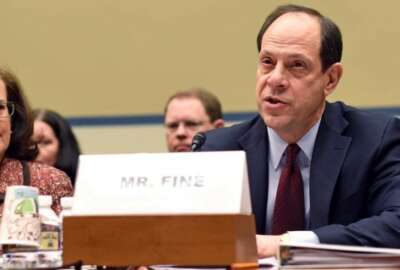
JEDI cloud project: Clean but still tainted?
When it eventually awards JEDI, DOD will have to be totally transparent.
On Wednesday the U.S. Court of Federal Claims will hear arguments on the merits of the Oracle Corp. lawsuit against the Defense Department’s planned cloud computing acquisition. The so-called JEDI deal (Joint Enterprise Defense Infrastructure) will be worth up to $10 billion over 10 years to the winner. That is, if the award actually occurs in August, as Defense CIO Dana Deasy predicted.
Don’t hold your breath.
The JEDI project is tainted, if not in fact but in perception. As Federal News Network been reporting, the Oracle suit contends a lot of nefariousness against both Defense and Amazon Web Services officials. The central argument has a couple of tenets it says lead to the conclusion the solicitation was illegally wired. Oracle claims conflict of interest on the part of Pentagon employees, and also that the single-award approach is contrary to competition rules. Oracle also challenges the so-called “gate” requirements leading to a down-select that left out Oracle.
Either the total effort is a mess, or a sore loser is throwing everything at the legal wall to see what will stick. Both sides seem certain of their contentions. That’s why we have courts.
Now comes reporting — not part of Oracle’s suit — raising concerns about meetings between Amazon and Defense people. The AWS lead in Washington, D.C., Theresa Carlson, met with then-Defense Secretary James Mattis. One meeting took place at a fancy dinner in London. According to the account published in the Wall Street Journal, the dinner organizer said they didn’t discuss cloud computing.
To be sure, the meeting wasn’t exactly coffee and chips at Wimpy. No, that meeting took place at the hoity-toity 5 Hertford Street Club, an uber exclusive and highly secretive venue. If no one discussed cloud, perhaps it did lead to a meeting a few months later between Mattis and Amazon CEO Jeff Bezos. The Journal said a dinner organizer was a former British special forces general connected to a venture group in turn connected to Amazon in startup deals.
Aside from the fact of a meeting, there’s nothing provable here. Evidence, if you can call it that, is circumstantial, maybe far-fetched. True, few vendor executives meet at exclusive clubs overseas with U.S. Defense secretaries. Like it or not, Defense secretaries and principals in multi-billion-dollar companies, whether aerospace or technology, do travel in higher spheres than mere mortals. What do you think goes on at the Paris Air Show? Or Sea-Air-Space?
Mattis also met with Google and Microsoft CEOs in the same period, so there’s that. You can imagine any of a hundred topics Mattis might have discussed with the tech bosses.
And anyhow, hasn’t federal procurement policy for the last dozen years encouragedpre-solicitation discussions with industry? And doesn’t every customer-facing vendor operative, whether a business development conference groupie or a highly compensated VP of a multi-billion dollar division, strive to get the CEO in front of top federal leadership?
Back to the Oracle contentions. One centers on one-time Pentagon employees Deap Ubhi and Victor Gavin, who both have ties to Amazon. Oracle alleges Ubhi worked on the JEDI solicitation during a Defense Department stint in between jobs at Amazon. DoD has denied the pair had any meaningful role in crafting the solicitation, although they did find Ubhi acted unethically. Gavin went to cloud planning meetings after getting an offer from Amazon. DoD said he was under control by the contracting officer, Chandra Brooks.
Related Stories

With JEDI court case in home stretch, Oracle lays out contracting officer’s errors

DoD’s JEDI saga continues with government, AWS returning fire in latest protest filing
While $10 billion is certainly worth going all out for, the JEDI contract is small potatoes both for the Pentagon and for the eventual winner, presuming one of the big three or four cloud outfits will land the deal. JEDI will confer great bragging rights because of the importance and sensitivity of the data it will carry and because of its perch in the architecture of new warfighting doctrine.
Now only a judge can really say if whether the actions of those involved spoiled the JEDI solicitation. What the judge can’t rule on is whether DoD handled the whole project in such a way as to avoid the potential of nasty allegations in the first place. Too late for that.
Should the solicitation proceed to an award after Wednesday’s hearing and subsequent decision, DoD will still be dealing with a contract under a cloud, no pun intended. Too much has transpired. To mitigate the taint, DoD will have to zealously detail its award justification and the background leading to it. And it will have to conduct thorough and open debriefings to the losing bidders.
The reality is, even with the one-award strategy DoD has pursued for JEDI, the department’s components and factions will offer many other cloud opportunities. Agencies always find ways around mandatory deals. The open secret about cloud providers is the difficulty and expense of moving workloads from one brand to another. JEDI might prove highly useful for the workloads it sucks in, but that doesn’t mean it will be suitable for every workload.
Still, JEDI is a landmark project. Let’s hope the court clears it up one way or the other.
Copyright © 2024 Federal News Network. All rights reserved. This website is not intended for users located within the European Economic Area.
Tom Temin is host of the Federal Drive and has been providing insight on federal technology and management issues for more than 30 years.
Follow @tteminWFED




